This is Bill’s story as told to Melissa Gouty. Our “Opening Our Hearts” stories are based on people’s real-life experiences. By sharing these experiences publicly, we hope to help our readers feel less alone in their grief and, ultimately, to aid them in their healing process. In this story, Bill describes the total despair he felt after his wife’s death, his breakdown, and his recovery with the help of mental help professionals.
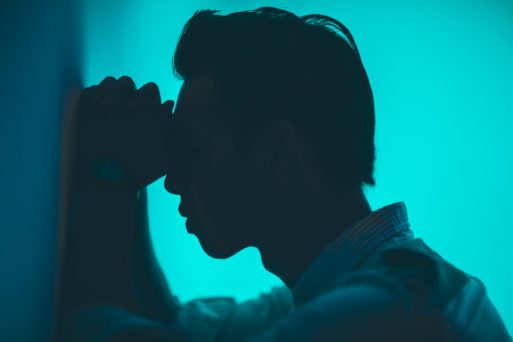
The Fighting Spirit
“She was a fighter.”
When we first got the diagnosis, breast cancer at the age of 32, my wife, Caulene, swore that she would beat it. We would fight it. We’d get second opinions. We’d try different treatments.
Caulene was known for never backing down from a fight. She had a reputation for being fearless about voicing an opinion and taking a stance. Caulene was deeply connected to the world and absolutely devoted to those she loved. She was fiery and spirited and fierce, and people who knew her felt her passion for life.
So no one was surprised when she said, “We’ll
beat this.”
I use the word “we” a lot,” because that’s what Caulene said. She was the one who had to feel the physical pain and endure the treatments, but she knew that I, too, would be a warrior for her, doing whatever I could to support and protect her as she battled for her health.
“I’d given little thought to breast cancer, and even if I had, I wouldn’t have imagined that a woman as young as Caulene would get it.”
It was such an odd thing. Here she was, just 32 years old. A seemingly healthy, vital young woman with a 7-year-old child. I’d given little thought to breast cancer, and even if I had, I wouldn’t have imagined that a woman as young as Caulene would get it. She’d never even had a mammogram because, 25 years ago, they weren’t recommended until the age of 50.
So when she felt a lump in her breast, she wasn’t too worried. Her mom had had a non-cancerous cyst removed, and she figured that’s what she had. And no matter what it was, Caulene was certain she was stronger and tougher than anything she could come up against.
The Speed of Tragedy
Caulene made an appointment with the doctor, who did a mammogram.
After the mammogram, everything went fast. That’s what scared me the most. Usually, doctors will schedule an appointment weeks in advance. That’s NOT how this worked.
Within the same day, the general practitioner did a mammogram, a sonogram, and got an oncologist involved. They did a needle biopsy that same day.
Within a week, they did a second biopsy under Caulene’s arm and found that the cancer had spread through her lymph nodes.
“So what does all that mean?” she asked.
The doctor reassured her. “You’re young. You’re healthy. You’ve got 90% odds of getting through this okay.”
Aggressive chemotherapy started, which Caulene undertook with her usual spirit and determination, believing it was worth it. But the chemo drugs made her deathly ill, so the doctors were forced to alter the treatment to a lower dosage with more time in between.
Next came radiation, which usually isn’t as bad as chemo. But after the first radiation treatment, Caulene got a terrible cough. I made her go to the doctor, who thought it was a severe case of bronchitis and prescribed antibiotics.
Ten days and a whole course of antibiotics later, Caulene had not improved, so we called the oncologist. He got her in immediately and performed blood tests.
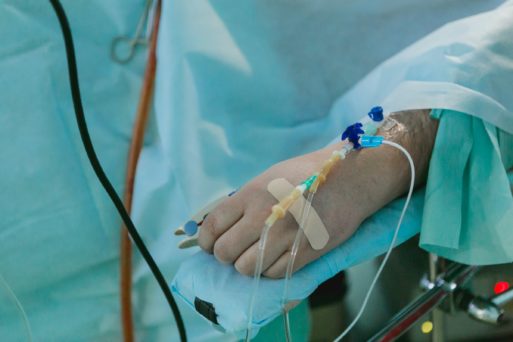
Caulene was incredibly brave, but the chemotherapy drugs made her dreadfully ill.
The Loss of Hope. The Imminent Heartbreak.“
The news wasn’t good. The cancer had spread into her lungs, and from that point on, everything went downhill.
When Caulene couldn’t breathe, she was admitted to the hospital. They put in two drains in her back, but eventually, the oncologist said, “We’ve fought this every way we can, but it’s spread to your other organs and there’s nothing else we can do. We can either keep you here at the hospital, or you can go home and get help with hospice.”
Of course, Caulene chose to go home where she could be close to her son and be in her own space. She got worse every day. She couldn’t eat anything or keep anything down except for an occasional piece of watermelon.
Caulene had changed. She hadn’t given up, exactly, but she had accepted the inevitable.
“In less than eleven months, Caulene lost her fight, cancer conquering that beautiful, buoyant, brave woman who had been the light of my life.”
The last week, the pastor came three times. Her sisters and mother sat with her for hours. Caulene tried to record a message for our son, but there just wasn’t enough of her left. She was diminished. Tired. Ready.
I was there every minute of every day. I held her hand, and held her up, and did everything I could think of to do, but it just wasn’t enough. In less than eleven months, Caulene lost her fight, cancer conquering that beautiful, buoyant, brave woman who had been the light of my life.
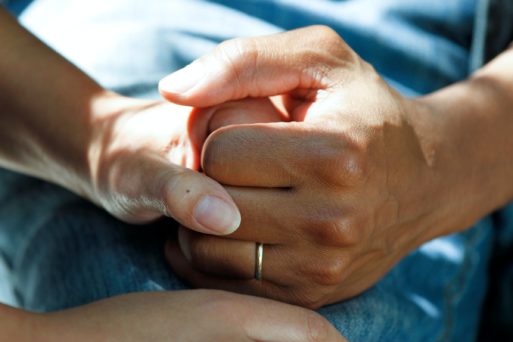
My First True Love
Caulene was my first true love, my second wife. I had been married for 21 years to another woman and been through a divorce that had been years in the making. I knew Caulene at work, and we started talking after the divorce that had bruised and battered me. Then we began dating and married soon after. She was 17 years my junior.
Was I lonely? Was I looking for a relationship when we found each other? I don’t think so. I was simply bowled over the powerful presence of Caulene. By her energy. By her enthusiasm. When she walked into the room, people noticed…It was like she made the air vibrate or shot electric current into the atmosphere.
Caulene became the driving force and center of my life.
When she died, I was devastated. Absolutely, utterly broken. That’s really what this story is about. Lots of people suffer the death of a spouse or face unimaginable tragedy, but not everyone falls apart afterward like I did.
The Grim and Often Untold Aftermath of Grief
After Caulene died, I shrank back into myself. I burned our mattress. I hired a nanny for our son. I didn’t work for a year. I just wasn’t there. Insurance money paid the bills. Not me.
“Everyone said, ‘Well, you’ve got your son,’ but that wasn’t enough for me. I wanted what I had lost.”
It was tough because for months and months, I wasn’t strong enough to do anything. I just stayed stationary. I pretty much abdicated my responsibilities and started drinking heavily every night. Alcohol numbed me.
I didn’t think I had anything to live for. “Everyone said, ‘Well, you’ve got your son,’ but that wasn’t enough for me. I wanted what I had lost.”
When I told my doctor, “If I was to die I would be with her and that would be the best thing for me,” he quickly shut me down: “No. That’s not how it works.”
He got me to check into The Pavilion, a mental health center.

For some people, the weight of grief can lead to hopelessness, despair and even thoughts of suicide.
I’m not proud to admit that I had such a complete breakdown, but I don’t think I’m alone, and I want to share this story because people need to know that it’s not uncommon to feel suicidal after the death of someone you loved.
Eternal Gratitude for Mental Health Professionals
The doctor who sent me there and the mental health professionals at The Pavilion saved my life.
Time was blurred, but throughout the course of a week or so, I met with small groups of people who had experienced losses like me. It helped to hear their stories. It helped to talk about why I felt the way I did with other people. Turns out, I had “situational depression,” which is very different from people who are depressed all the time.
The people at The Pavilion got me back on track. They really understood what I was going through and were trained and compassionate at pointing me in the right direction. One of my assignments was to write goals for what I wanted in the future. What I wanted to achieve. Doing that made me understand that I didn’t have to be trapped in the past.
I will be forever grateful to them and am happy that my insurance paid for this kind of help and counseling.
“The opposite extreme of the devastation I felt when Caulene died was the HIGH I experienced when I found love again.”
The “After-Life” of the Aftermath
About a year after Caulene died, I got myself back together. I began to be able to talk about her and thought I would do something to honor her. My work as a contractor has always given me comfort and a sense of purpose, so it was only natural that I thought about building something. Caulene and I had always talked about adding a sunroom onto our house, so I began to build it. On a small scale, it was a Taj-Mahalian effort, my memorial and labor of love to the woman I had lost.
I’m so glad I did it. Every time I walked into that room, I got a strange comfort from the sun-filled, gorgeous room with floor-to-ceiling windows, knowing how much Caulene would have loved it.
Life Goes On. Really.
Life went on. I got stronger. I continued to meet with a therapist, following her instructions and doing exercises to strengthen my mental health. One of my assignments was to create a list of the qualities I’d want in a woman in my future. At the time, I had no interest in a relationship, but my counselor told me it would be fun to do it, and she was right. I made my list and began thinking about what it might be like to have a real relationship again. Shortly after, my counselor discharged me from her services because I was ready to face the world again.
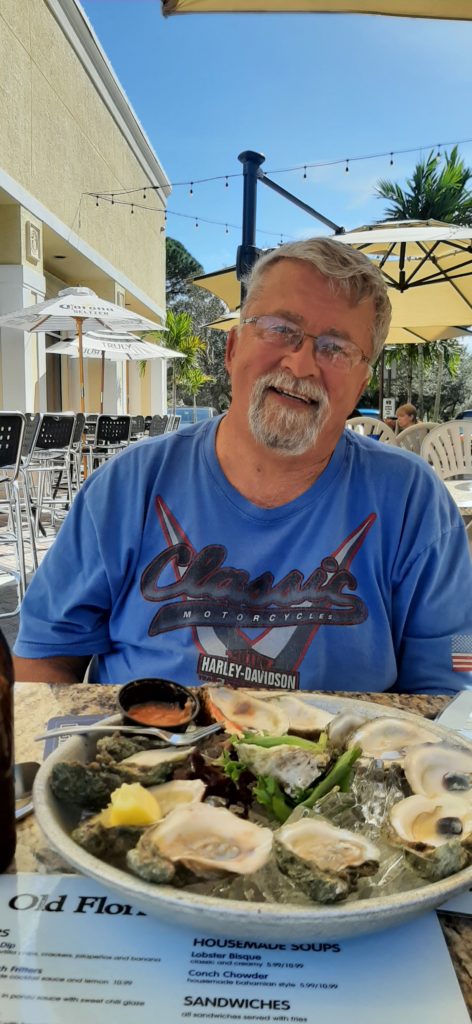
Twenty-five years after Caulene’s death, Bill is enjoying life (and oysters!) to the fullest and thankful for a chance at a new life.
Four years later, I met a woman who had all the qualities that I valued in a woman… (I had the old, folded list in my wallet to prove it!)
The opposite extreme of the devastation I felt when Caulene died was the HIGH I experienced when I found love again. Lucky for me, I got help after Caulene died and continued living to find a new chance at happiness in my beloved wife, who has brought new light and laughter to my life and given me the best 20 years I’ve ever had.
Don’t give up. Get help. There is life after tragedy and love after loss.

 A Tragedy in Two Parts: Grief and Its Grim Aftermath
A Tragedy in Two Parts: Grief and Its Grim Aftermath


 Having an Estate Plan Is Essential – So Is Discussing It With Your Children
Having an Estate Plan Is Essential – So Is Discussing It With Your Children
 The Healing Sound of Singing Bowls
The Healing Sound of Singing Bowls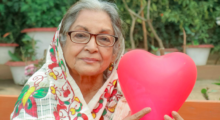
 “Summons” by Aurora Levins Morales
“Summons” by Aurora Levins Morales














